



Have you ever faced the dilemma of wanting to look smart and put-together without crossing the line into overly formal territory? It’s a common concern, and striking the right balance can make all the difference in how you present yourself. So, how do you master the art of looking polished and stylish without feeling like you’re heading to a black-tie event or into a formal office environment?
Defining “Too Formal” for You
What exactly does “too formal” mean to you? The answer can vary greatly from person to person, and it’s crucial to start by defining your own comfort zone. Consider the environments where you often feel like you might be slipping into overly formal attire. By identifying these scenarios, you can begin to tailor your style strategy accordingly.
It’s worth noting that what might be deemed too formal for one person could be just the right level of dressiness for another. The key is finding that sweet spot that aligns with your personal preferences and the occasions you frequently encounter.
&iv;&modestbranding;&rel;&autohide;&playsinline;&autoplay;
Observing Stylish Inspiration
To navigate the balance between smart and casual, it’s wise to draw inspiration from people whose style you admire. By paying attention to the choices of those whose style resonates with you, you can unravel the mysteries behind their fashion choices. Think of it as decoding a visual language that communicates volumes about their personality, preferences, and how they navigate the world.
The Fabric of Elegance
One of the first aspects to note when observing stylish individuals is their choice of fabrics. Fabrics can instantly elevate an outfit or lend it a more relaxed vibe. Take note of the textures that catch your eye—whether it’s the soft drape of a silk blouse, the structured feel of a tweed blazer, or the casual comfort of a knit sweater.
I remember one client telling me how she often felt too dressed up when she was trying to dress in a smart casual way. She showed me a photo of an outfit she liked and then she showed me her take on this outfit, similar kinds of garments from head to toe in both. The woman in the photo was wearing a cotton scarf, in my client’s interpretation of this outfit she had on a silk scarf, so the whole outfit looked more dressy and formal, whilst the cotton scarf made the outfit feel less formal. She hadn’t noticed the difference in fabric and how big an impact something as small as that had on the whole vibe of the outfit.
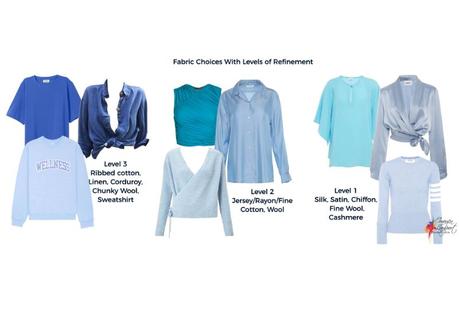
Structural Elements and Details
The structure of clothing is another aspect to observe closely. Pay attention to how stylish individuals play with different structural elements to achieve their desired aesthetic. Whether it’s a well-fitted blazer that adds a tailored touch or a flowing maxi dress that exudes an air of effortlessness, these structural choices contribute to the overall vibe of an outfit. Just adding some sort of jacket or blazer will make an outfit appear smarter than wearing a jumper, knit or sweater.
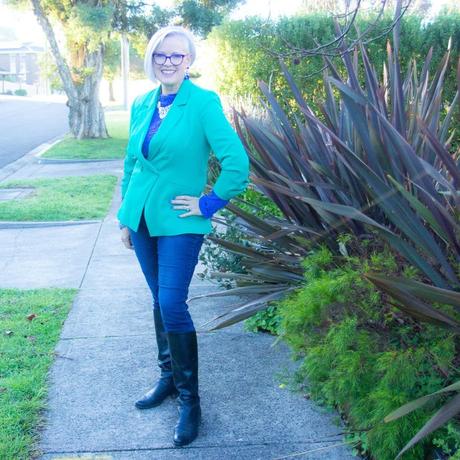
Adding a jacket that has some structure easily makes a casual jeans and knit top outfit feel more dressy.
Color Palette and Cohesiveness
Stylish individuals often exhibit a keen sense of color coordination. Observe how they effortlessly blend different hues to create a cohesive look. Most frequently people who look great in their outfits wear colours that work with their colouring, and then they repeat their natural levels of colour and value contrast in their outfits, which is why they look so good. Whether it’s a monochromatic ensemble or a well-balanced mix of complementary colors, their choices reflect an understanding of color theory and how to apply it to their own appearance for maximum effect. If you want to discover your own best colours and contrasts, get yourself an online colour analysis so that you know exactly what works for you and can start putting together outfits that make you really shine.
Cracking the Code of “Levels of Refinement”
One fantastic tool in your style arsenal is the concept of “levels of refinement.” This principle helps categorize clothing into three distinct levels, allowing you to pinpoint where different pieces fall in terms of formality. Let’s break them down: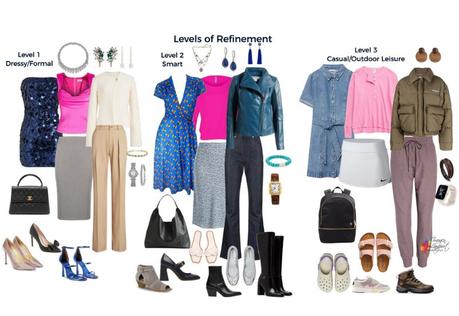
- Level Three – Outdoor Leisure: This is the most relaxed level, encompassing attire suitable for casual outdoor activities. Think walking, gardening, or a laid-back weekend.
- Level Two – Everyday Casual to Smart Casual: This is the space where many of us live our lives. It’s the balance between casual and polished, including outfits perfect for most workplaces and day-to-day activities.
- Level One – More Formal Wear: The top tier in terms of formality, level one involves clothing suitable for formal business and formal evening occasions. This is where you find structured pieces, more refined fabrics, and an overall polished look.
Strategically Integrating Formal Elements
The key to looking smart without overdressing lies in the art of selective incorporation. Suppose your preferred level of refinement is comfortably nestled in level two. In that case, you can integrate elements from level one to add a touch of formality without veering into overly dressed territory.
For instance, consider pairing a blazer with jeans. While the blazer brings a more formal touch, the jeans keep the overall look grounded in a casual-smart vibe. Play with textures, colors, and accessories to blend elements seamlessly.
Accessories are great to dress up or down an outfit. Here I’ve used sparkly jewellery to dress up a casual outfit.
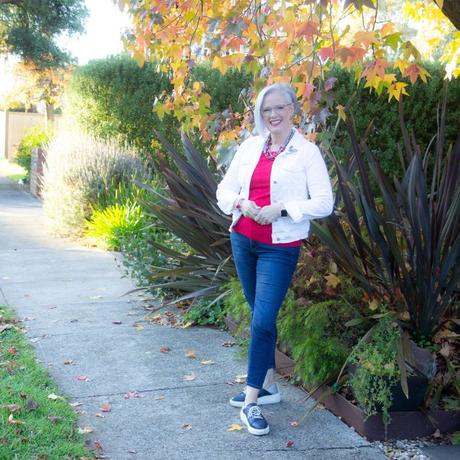
Keeping It Balanced
When aiming for a smart yet not overly formal look, striking the right balance is everything. Avoid going overboard by mixing too many level-one pieces together, such as satin shirts, sparkly necklaces, and formal shoes, as this can quickly push you into a realm that feels too dressed up.
On the other hand, be mindful not to slide down into level three by pairing your look with overly chunky or rugged footwear. Finding that equilibrium between casual comfort and subtle sophistication is the key to a stylish outcome.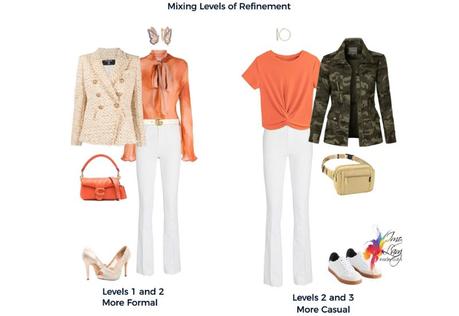
It’s easy to mix levels of refinement that are next to each other – Levels 1 and 2 or Levels 2 and 3, but Levels 1 and 3 don’t mix so easily together (unless you have a creative or rebellious personality you’ll find it hard to carry it off).
If you want to dress up your jeans, find something level 1 to wear with them.
Want to dress down a dress? Try a level 2 jacket such as a denim jacket to make the outfit feel more casual.
Comfort and Confidence Above All
Ultimately, your style journey is about aligning your attire with your authentic self. Feeling smart and stylish should boost your confidence, not make you question your outfit choice. Experiment, play around with different combinations, and reflect on what makes you feel best. Getting an education and the knowledge you need to be able to do this is a great investment and why I developed my 7 Steps to Style program.
Remember, the beauty of style lies in its ability to adapt to your personality and circumstances. So, as you curate your wardrobe, keep comfort, confidence, and your unique fashion identity at the forefront. The goal is to step out feeling empowered, regardless of whether your attire leans a tad more toward smart or casual.
Further Reading
Levels of Refinement
How Formal is That Print or Fabric?
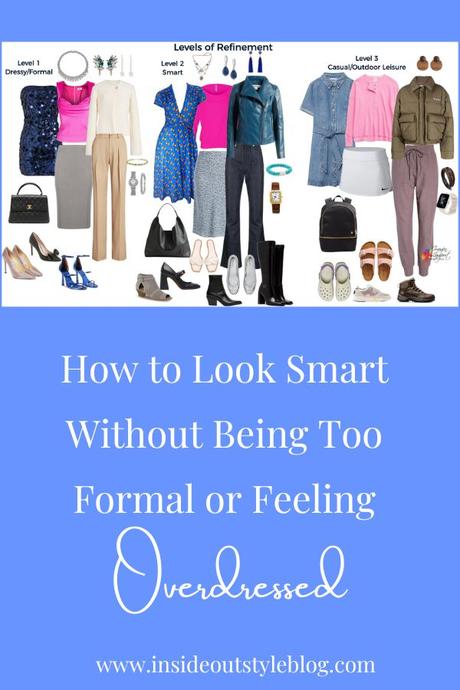
How to Look Smart but Not Overdressed






